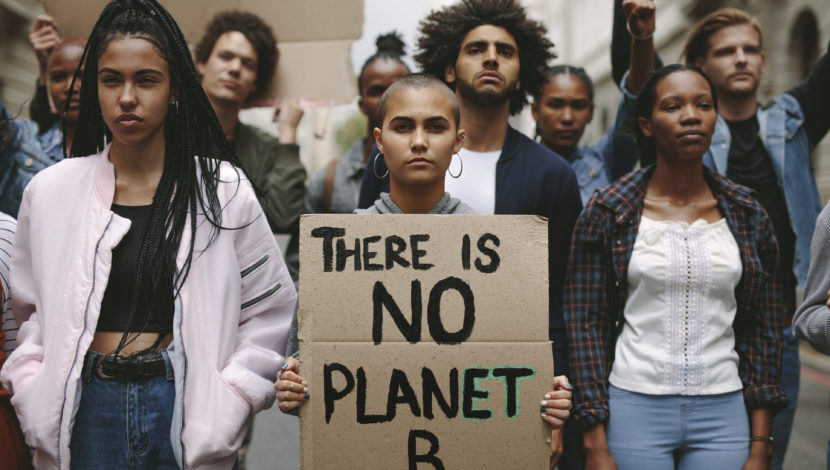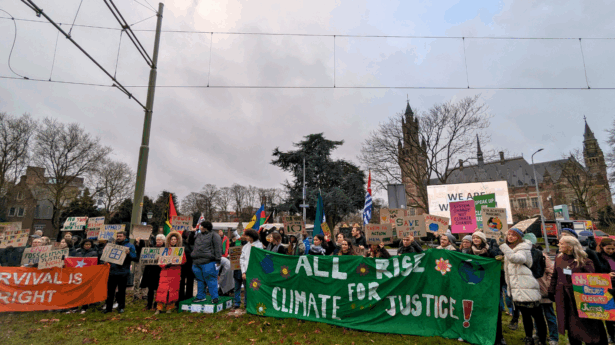The Unitarian Universalist Service Committee advances human rights through grassroots collaborations.
5 Steps to Address Climate-Forced Migration

By on July 14, 2021
Human displacement and migration due to climate change is not a hypothetical possibility. Around the world, it is already taking place, and will only increase in the decades ahead. Hurricanes, wildfires, and other natural hazards gain in intensity as a result of global warming, and a changing climate affects many communities’ ability to access the food and water they need to sustain life. Scholars estimate these human-caused climate impacts are likely to displace upwards of 140 million people by 2050—a grave threat to their human rights to life, shelter, family integrity, and a place to call home.
These facts can and should alarm us. But they need not discourage us. Governments can respond to this situation in ways that uphold human rights and meet the needs of everyone affected. Climate-forced displacement is a large challenge, but not an unmanageable one, provided world leaders respond in ways that center compassion, equity, and fairness. Below are five steps they can take now, based on a new report by the Joint Task Force on Climate Migration, which includes UUSC’s President and CEO Rev. Mary Katherine Morn:
- Recognize that climate migration is inevitable. Much of the U.S. administration’s current rhetoric treats migration as a “problem” to be “solved.” For instance, Vice President Kamala Harris was recently tasked with finding ways to “stem migration” from countries in Central America. As the administration has acknowledged in other contexts, however, increased global migration in coming decades is an inevitability, due to the impacts of climate change. Politicians therefore need to flip the script on migration. Instead of seeing it as a negative to be combatted or policed, we must foster safe pathways that allow people to uphold their rights under conditions of displacement.
- Uphold the principle of fairness in addressing climate impacts. Most of the people being displaced by climate change live in the Global South. Many come from Indigenous communities or other oppressed groups whose rights their own governments have failed to uphold. These communities have done the least to contribute to the problem of climate change historically, yet they face the worst of its effects. Meanwhile, rich governments like the United States have not come close to paying their fair share to help people affected by the crisis. U.S. leaders must recognize the unfairness of this situation and work to remedy it.
- Increase support for global and regional initiatives to address climate impacts. Because the U.S. government has outsized historical responsibility for the climate crisis, they have a no-less-disproportionate obligation to fund the costs of adapting to, mitigating, relocating from, and compensating for the irrevocable losses and damages of the climate crisis. The Joint Task Force’s report offers a number of concrete steps the U.S. government can take to increase funding for global climate response and adaptation funds, as well as regional initiatives led by and for the most-impacted countries.
- Provide pathways for migration and resettlement for people displaced by climate change. People around the world are forced to leave their homes by a host of natural hazards and human-made crises, many of which are linked to or exacerbated by climate change. Yet—generally speaking—existing law fails to take climate into account as one of the factors that forces people to become refugees. The U.S. government can remedy this both by broadening the definition of refugee under current law, and by creating or expanding discretionary forms of humanitarian protection. The latter can happen now, at the White House’s own initiative.
- Address internal climate displacement and the need for relocation. Climate migration between borders is likely to increase in the decades ahead, but it is also important to recognize that the vast majority of climate displacement happens inside national boundaries. This is as true in the United States as anywhere. The U.S. government must not only respond to global displacement, therefore, but also provide solutions for U.S.-based communities facing climate impacts. Our co-created policy brief on climate-forced displacement provides community-informed guidance on how to do so.
The Biden administration has already taken a historic step forward by recognizing the reality of climate migration and tasking officials with producing a report on how to address this challenge. We hope this report will be informed by the recommendations of the Task Force, as well as by the policy brief for addressing internal U.S. climate migration our co-convened Legal Justice Coalition developed.
Time is short and running out, but the task ahead is not impossible. By adopting the measures discussed above, governments can play a significant role in ensuring that human rights are upheld even in the context of a global climate crisis.
***
About UUSC: Guided by the belief that all people have inherent worth and dignity, UUSC advances human rights globally by partnering with affected communities who are confronting injustice, mobilizing to challenge oppressive systems, and inspiring and sustaining spiritually grounded activism for justice. We invite you to join us in this journey toward realizing a better future!
Image Credit: iStock–Jacoblund

